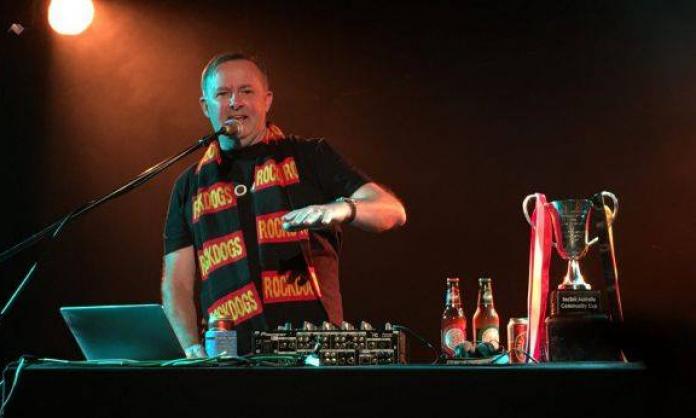For an ashen-faced bureaucrat who has spent 20 years quietly decaying in the House of Representatives, Anthony Albanese displays a stunning capacity to fire the imaginations of certain demographics.
He is “Hot Albo” on the internet when a 30-year-old photograph of him with an earring inspires thousand-word love letters from Van Badham about how it’s Albo’s ideas that are truly hot. He is “DJ Albo” in the clubs when he queues up Jet’s Are You Gonna Be My Girl on Spotify and is rewarded with a “rock star reception” from dwindling crowds of Labor students, who pay $25 to subject themselves to the ordeal.
There’s a cultish disconnection from reality that characterises the ALP’s shrinking pool of overpaid media advocates and party activists. What well-adjusted person, of their own free will, would allow themselves to feel inspired by Albanese? At least real cults promise a shining future of eternal life aboard a heavenly UFO. If the shadow minister for transport represents the utopian vision of your organisation, you are getting a raw deal.
But since the British general election, some more daring journalists have suggested that Albo could play an even greater role.
Insurgent left wing backbencher Jeremy Corbyn has smashed up the political traditions of the right wing British Labour Party – installing himself as leader on a wave of popular support, massively increasing the party’s membership, winning the biggest increase in Labour votes since 1945, stopping the Tories’ austerity program in its tracks and inflicting a terrible political blow on the government.
Corbyn has created a political reality in which it’s perfectly normal for crowds of thousands – at demonstrations, music festivals, or merely in the city on a Saturday night – to sing the name of the Labour Party leader.
Not bad for two years’ work. And, one would expect, a worthy aspiration for any ambitious Labor Party official to mimic. If anyone could get the kids singing his name, surely it would be DJ Albo? That’s the argument put by, among others, Peter Hartcher in the Sydney Morning Herald and Troy Bramston in the Australian, who believe Corbyn’s success is likely to result in a revival of Albanese’s leadership ambitions. Bramston describes Albanese as being, like Corbyn, an “anti-establishment” “class warrior”.
Anti-establishment? It’s a funny way to describe Albanese, who served as leader of the house in 2007-2013 under successive right wing Labor governments – arguably the most right wing Labor governments in Australian history.
DJ Albo coordinated the enactment of every foul bit of anti-worker, anti-student and anti-migrant legislation, from “Workchoices Lite” to the failed attempts to cut university funding and send refugees to rot in Malaysian camps. He has never put his career at risk by voting against Labor’s line in parliament. And he made sure nobody else did, either.
Corbyn, by contrast, has never had an official government position. He rebelled against right wing Labour governments, voted against their policies and, crucially, coordinated mass public opposition to them. While Tony Blair, as Labour prime minister, was selling the Iraq war, Corbyn organised the Stop the War Coalition, building mass protests against Labour policy.
Corbyn’s “authenticity” is not a performance: he really, truly has been an activist for decades, and is known on a first-name basis in many working class and migrant communities. Many of the young Black musicians who created the Grime4Corbyn movement did so, not because Corbyn played DJ sets at pubs, but because he had worked in their communities fighting for their civil and social rights.
Young activists campaigned for Corbyn because he promised free education and a massive expansion of the public sector, neither of which Albanese supports. Albo may speak, rarely, at a demonstration when it matches Labor’s electoral priorities. But the idea of him, or any other Labor “left” MP, actually organising public resistance to neoliberalism is unimaginable.
Corbyn has always publicly condemned the rightward drift of Labour in word and in deed. For this, he was for decades condemned to the wilderness, focusing on activism and treated with scorn by his own party.
By contrast, Albo’s most important role has been to play the allegedly hot face of the decidedly not-hot Rudd and Gillard governments. The ALP left, with Albo as its figurehead, is a PR agency for the right wing Labor establishment, not an opposition. These days, they can barely be politically distinguished. And when the right wing Labor bureaucrats put the “left” Gillard into the prime ministership, it was a purely cosmetic change.
Albanese, and by extension the Labor left, admit this truth, and enjoy the role. On Adelaide radio, Albanese eagerly accepted Christopher Pyne’s reassurance that he is far more right wing and is at best “a poor man’s Jeremy Corbyn”. “That’s true”, was the grateful response of Pathetic Albo.
Debating Bill Shorten for the Labor leadership in 2013, Albanese emphasised that they disagreed about basically nothing except who should be in charge. Facing a challenge from the Greens in 2016, Albanese ran a vile campaign of anti-socialist invective and was rewarded with a front page “Save Our Albo” endorsement from Murdoch gutter-rag the Daily Telegraph, whose editors clearly know where Albanese’s real sympathies lie.
Albo’s “left” is an employment agency for right wing hacks, whose greatest ambition is to wield power on behalf of Australia’s bosses. They would react with fury and terror to the emergence of a disruptive revival of left social democracy, as did their co-thinkers in British Labour.
An Australian Corbyn would find a devoted enemy in hypocritical right wingers like Anthony Albanese – and in his deluded supporters. In the meantime, sufferers of Albophilia should be encouraged to upgrade to a more realistic option. The Church of Scientology offers free personality tests, and its devotees are promised telekinetic super-powers by their cult leaders. It’s worth a look.




